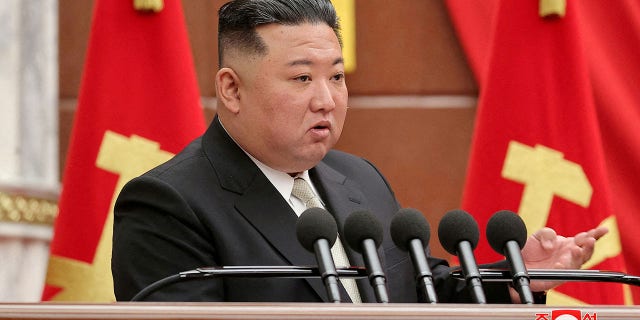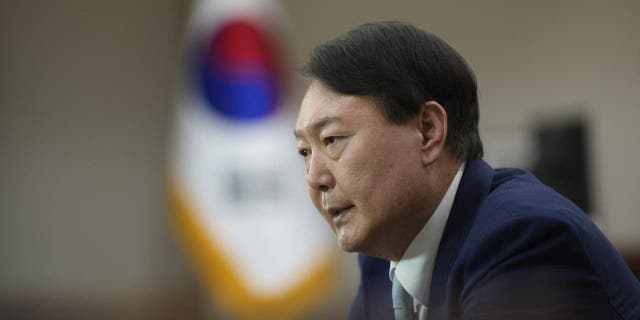The South Korean government is not interested in ending the Korean War until a laundry list of issues are addressed.
President Yoon Suk Yeol’s administration will “never” seek an end to the 70-year-long conflict, Reunification Minister Kim Yung-ho said Thursday in one of his first conferences since being appointed.
NORTH KOREA ‘ACKNOWLEDGED’ TRAVIS KING SITUATION IN COMMUNICATIONS WITH UN
An armistice agreement in 1953 ended active military combat between the two nations, but Kim warned that a formal end of the conflict would jeopardize North Korea’s accountability for prisoners of war and kidnapping victims.
In this picture taken near the truce village of Panmunjom inside the demilitarized zone separating the two Koreas, a North Korean flag flutters in the wind at the propaganda village of Gijungdong in North Korea. (ANTHONY WALLACE/AFP via Getty Images)
“What I can clearly say is that conditions for the end-of-war declaration have not been met. If such a declaration is carried out, the issue of abductees, prisoners of war and detainees in the North will be overshadowed,” Kim said.
NORTH KOREA AND CHINA SHARE ‘COMRADESHIP WRITTEN IN BLOOD,’ XI TELLS KIM IN OFFICIAL LETTER
He added, “I can promise that the Yoon Suk Yeol administration will never pursue the end-of-war declaration.
This stance is a departure from policies of the previous administration under President Moon Jae-in, who believed such a declaration would be the first step toward securing reunification of the country.

North Korean leader Kim Jong Un attends the 7th enlarged plenary meeting of the 8th Central Committee of the Workers’ Party of Korea in Pyongyang, North Korea. (KCNA via REUTERS)
North Korea, officially known as the Democratic People’s Republic of Korea, is a totalitarian state ruled by the Kim family regime. Its government, institutions and infrastructure operate under a distinct form of communism known as “juche.”
NORTH KOREAN, RUSSIAN DEFENSE MINISTERS HOLD MEETING IN PYONGYANG AMID CELEBRATIONS
Kim assumed his role as reunification minister on Friday of last week, taking the lead on inter-Korean dialogue and policymaking.
The two countries’ long history as one nation — coupled with families segregated on opposite sides of the border — make North Korea and South Korea’s long-term relationship a key issues in regional politics.

South Korean President Yoon Suk Yeol speaks during an interview at the presidential office in Seoul, South Korea. (AP Photo/Lee Jin-man)
CLICK HERE TO GET THE FOX NEWS APP
The arrest and abduction of South Korean citizens by North Korean forces is a prominent source of ire between the two nations.